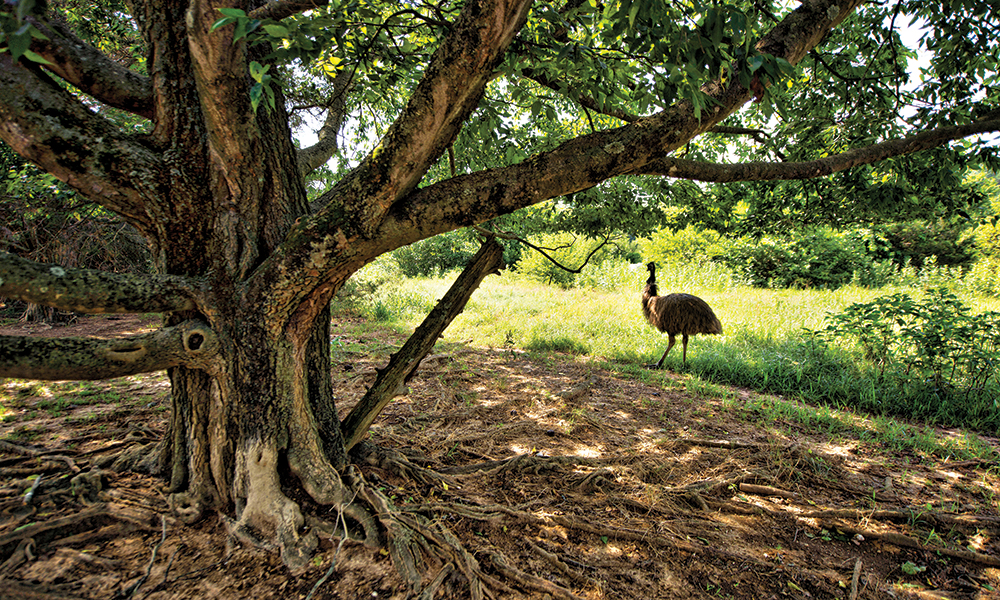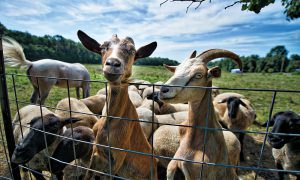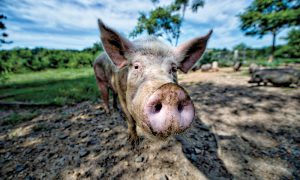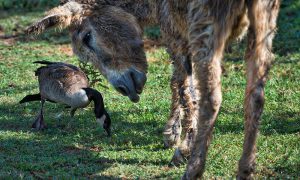
The emu named Peepers poses for a photo session at the refuge.
Sometimes, even hard cases respond to a little affection.
By Glenda C. Booth, photos by Doug Graham
“Don’t wear any dangly or sparkly earrings,” instructs Lolly Busey when she prepares visitors for Rikki’s Refuge in Orange. “The emus are five to six feet tall and can yank earrings out of your ears!”
Yank, indeed! Peepers, one of the refuge’s three emus, has swiped glittery earrings and necklaces, a gold watch and a barrette from unsuspecting but adoring fans. He even snagged a shiny money clip out of a backpocket when the visitor bent over to tie his shoe.
Peepers is such an adept pickpocket that he earned a chapter in a 2017 National Geographic book, Terrier Troubles and More True Stories of Animals Behaving Badly, by Candice Ransom. Ever ready to snatch, Rikki’s emus eagerly await broccoli bouquets, their favorite treat, but Peepers, quick as lightning, zeros in on sparkly, glittery objects.
Peepers is right at home at Rikki’s Refuge with 1,300 other animals. It’s not just a caring home for mischievous avian pranksters. It’s also a place of affection, human and animal. Rikki’s gives lifelong care to its “residents,” many of whom no one wants. Founder and executive director Kerry Hilliard believes that no matter how many legs you have, you deserve a loving home, trust, and respect. She cites her experience 40 years ago rescuing an abandoned cat and explains, “There have been thousands, almost ten thousand, eyes like his I’ve looked into and helped to change from untrusting, sad, fearful, and unloved, to trusting, happy, loving, and joyful and given them a home where they are appreciated for who they are. What more can anyone want in life?”
The refuge, now in its 20th year, devotes 100 of its 450 acres to animal care and the rest is left wild for farm animals and wildlife. They take in ill, disabled, injured, abandoned, homeless, and abused domestic and farm animals, now up to 22 species,like dogs, cats, cows, horses, pigs, rabbits, ducks, geese, emus, goats, turkeys, peacocks, and more.
There are “neighborhoods” with names like Feline Fields, Doggy Downs, Piggy Paradise, Horsey Haven, Chicken City, Ducky Digs, Goosey Gardens, Ramsey Residence, Capri Corners, Pigeon Palace, and areas “designed just for the happiness and comfort of their residents,” explains Lolly Busey, director of administration.
When visitors arrive, a friendly menagerie immediately gathers. And all around are cats wandering, chickens strolling, roosters strutting, ducks and geese waddling, goats nudging visitors’ thighs, and turkeys and peacocks spreading their multi-colored, tail feather display. “You can’t go anywhere without animal interaction. The animals always have the right of way,” advises Busey, a vegetarian and avid animal lover.
The main yard is a constant, discordant symphony of quacks, honks, coos, brays, clucks, gobbles, barks, meows, caws, bleats, moos, neighs, and some difficult-to-identify sounds. Think you hear screaming woman? It’s the peacocks’ normal call.
Some are curious about their human visitors; some not, but many clearly associate noisy vehicles rolling in and the bipeds that emerge with the chance to land a tasty snack. The savvy supplicants sniff and beg gently for handouts. Busey urges visitors to bring treats — bird seed, apples, grapes, carrots, celery, sweet potatoes, fruit, watermelon, berries, and of course, broccoli bouquets.
Some parts of the farm are picture perfect pastoral scenes, like the cows dawdling about in a pasture, grazing. “They are gentle giants,” Busey says. “We got four off a veal truck.” In other words, these hapless bovines were rescued from a truck headed to the slaughterhouse and volunteers brought them to the farm and bottle fed them to adulthood.
The Rabbit Rotunda no longer houses rabbits but is home to ducks and peacocks that cannot fly. Most peacocks are confined up to age two because of their instinctively aggressive behavior, but then they “graduate” to roam free and strut their stuff. And strut they do, obliging new human faces by unfolding their tail feathers like an elaborate lady’s fan. When people visit the pasture, the goats scramble up on their hind legs and plunk their front feet on the fence, hoping for a treat. Few hapless humans can resist their plaintive doe eyes and gentle ways.
Not only do the animals comfort their caregivers and guests, they comfort each other. Take the example of the devoted “couple,” Bub and Goose, who loll around the pasture, always together. Bub is a forlorn-looking, arthritic donkey in his 40s who lost his mate, BeeBee. “He was devastated and we were terribly worried that he would not make it he was so brokenhearted,” recounts Busey. Then, a Canada goose that they named Goose, flew into Bub’s pasture without a mate. Somehow, an unlikely friendship was born and now they are an inseparable pair. Goose even preens raggedy Bub. They were featured in a National Geographic book titled 125 True Stories of Amazing Animal Friendships published in May.
How Do They Get to Rikki’s?
The path to Rikki’s is varied. Many critters come from local animal control officers who get calls about apparently unowned, neglected, or abused animals. Madison, a horse, arrived in 2016 with one bad eye and only a few teeth. He was a scraggly skin-and-bones shadow of himself. A staffer nursed him back to health and now he’s content.
Some animals are there because their owners tire of them. Well-meaning people buy pot-bellied pigs when the piglets are small and cute, but when they grow up, owners are overwhelmed and have to face the reality of owning a 200-pound swine. Easter chicks and ducklings pluck people’s spring heartstrings, but then they grow up, the fancy fades, and families cannot care for them. Some goats came to Rikki’s when a woman’s parents died and she had to downsize the family farm.
Peepers and his two emu pals were the subject of a well-intended but naïve classroom project. Youngsters hatched and raised the emus, but at just a few months old, the birds were several feet tall, beyond the teacher’s and students’ management capabilities. Rikki’s welcomed them.
Some owners learn too late that they are allergic to their pets. Some animals come from petting zoos. Some felines are brought from colony cat trappers.
Who Gets “Admitted”?
Several factors determine whether Rikki’s accepts an animal. Space appropriate to an animal’s needs is a key consideration. And if the animal has an injury or disability, staffers must have the expertise to care for the animal.
Some animals require special care that typical pet owners cannot provide. As many cats and dogs age, they become disabled or develop chronic illnesses and require more care. Cats are overwhelmingly the animal most in need of homes, says Busey, and Rikki’s typically has 500 to 600 cats, so many requests for “admission” that the caregivers have to limit cats to those needing specialty care.
One of the most common cat diseases at the sanctuary is feline immunodeficiency virus (FIV), which typically causes a weakening of the cat’s immune system and is related to human immunodeficiency virus (HIV). The second is feline leukemia virus, a contagious disease which requires special houses. Many sanctuaries will not take cats with FIV or feline leukemia.
All cats are spayed, neutered and inoculated for rabies. All cats have houses and outside play space with real trees, fake trees, and play furniture. “Our cats have their own apartment complex,” Busey chuckles. Some of the feral cats never socialize to humans and are confined in large cage-like structures.
- Here a 40-year old donkey named Bud and his companion goose make the rounds at the refuge.
Some animals don’t fit the typical, American cute-and-cuddly pet persona. Rikki’s has a three-legged dog and a goat that hobbles about determinedly because his back legs are splayed. Milo, another goat, has one horn. “He’s our unicorn,” Busey quips. These are the differently abled.
What makes Rikki’s Refuge stand out is that it offers lifelong homes and care for able and disabled animals that otherwise would likely die. “We are absolutely no-kill,” explains Busey. Animals that die at Rikki’s are buried in the farm’s cemetery.
“We are blessed to have the land, the volunteers and the staff to help us build and maintain housing and to care for everyone every day,” explains Busey. “And just as important, we love and treat them all as beloved family, no matter what.” The farm provides care for animals that few people want and the caring goes to the end of life. “That is what sets Rikki’s Refuge apart from most other animal organizations,” boasts Busey.
A Caring Start
The sanctuary was started in 1998 by the family of a deceased Balinese cat to honor their beloved pet, Rikki. Kerry Hilliard, founder and current director, did cat rescue and fell in love with the property.
The farm has eight staffers. Local Girl Scouts help out, for example, making colorful picture boards that add cheer. College students have special projects like painting the fence colorful hues of bright colors.
People can adopt animals from Rikki’s, but Busey cautions, “Though we always hope our animals will be chosen for adoption to wonderful homes, we know that most people want the cute, young, healthy, and perfect ones, not the kind that we are here to help and provide life care for.” So it takes an extra-special, nurturing attitude to adopt an animal from Rikki’s. For those that no one wants, they have a home for life at Rikki’s.
Amid the cackles, gobbles, mews and coos, through heat and cold, rain and drought, blue skies and gray, why does Busey give most of her time to this motley gaggle of critters? “Here the animals are loved and cherished. Here they thrive,” she stresses. “They know they are safe here. It makes me happy.”
Supporting Rikki’s
Rikki’s Refuge offers tours on most Sundays and holidays. Reservations are required. Email Tours@RikkisRefuge.org.
The refuge is nonprofit and welcomes donations, financial and otherwise. The farm can use items like cat food (dry and canned), horse feed, blankets, cat trees, bleach, paper towels, trash bags, sweet feed (livestock), cracked corn, children’s playground equipment and more.






Some of us would like to know if the animals can be adopted.
I believe it is possible, but happens only rarely. You would have to contact Rikki’s Refuge at http://rikkisrefuge.org/contact-information-and-more-2/